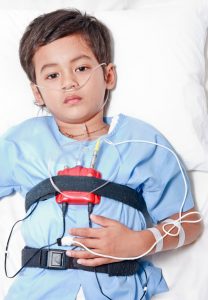Why Sleep Studies are Important
June 1, 2022

Did you know that sleep studies can be conducted at home? While some still imagine the uncomfortable process of laying in a doctor’s office or lab overnight, this is simply no longer the only option. Now, you can complete a sleep study in the comfort of your own home, in your own bed. Home sleep studies can effectively diagnose obstructive sleep apnea (OSA) and, potentially, save a life from this harmful disease.
Ryan Tiffin, one of our many incredible patients, suffers from severe OSA, a condition that is distinguished by a person experiencing apneas throughout the night. Apneas are moments in which a person stops breathing during sleep. The more apneas a person has during the night, the more severe their OSA.
“I have fallen asleep In the men’s bathroom. I have passed out in movie theatres and concerts. I have fallen asleep on active Zoom calls and meetings. I have been struggling with massive memory loss. I have fallen asleep talking to [my husband]. The blackout moments happen more often than not, and I sleep non-stop. This was all scaring me!” Ryan shares in a vulnerable Facebook post.
Like many individuals who snore, Ryan had no idea how bad his sleep apnea had gotten until his husband began videotaping him when he suffered an apnea episode: “I took the recordings to my primary care [physician] and was instantly told to get a new sleep study done, so I scheduled one with Sleep Dallas.”
Ryan’s shared that the sleep study confirmed what he suspected. “A severe Sleep Apnea patient on average stops breathing 30 times an hour during the night. The test clocked me at 103.6 times per hour on average. This means I was fighting 104 times an hour to breathe.”
Sleep studies are essential for OSA sufferers. They are the entry point to care. Here’s how sleep studies save lives.
What is a Sleep Study?
A sleep study is a non-invasive, overnight exam that monitors your sleep health. Sleep studies can be completed in a lab or at home. Both types of studies examine a person’s breathing, heart rate, oxygen levels, and various other variables that measure the quality of rest a person receives. While at-home tests are great ways to maintain patient comfortability and are used to diagnose obstructive sleep apnea, lab studies provide additional information that cannot be gathered while at home. According to the Sleep Foundation, this additional information includes “eye movements, brain and muscle activity, [and] body positioning and movements.”
Is a Sleep Study Covered by Insurance?
Most often, a person can have their sleep study covered by medical insurance. Be sure to check if your policy covers the sleep study first. Even if it doesn’t, submit the claim. If the claim is denied, appeal the denial. Often, with physician documentation as to why the test is necessary, coverage is likely to be approved.
What to Expect from a Sleep Study
If you plan to have a sleep study done in a lab—often called a polysomnography—you’ll likely receive your own room where you can go about your normal routine, whether that’s reading, journaling, meditating, etc. You will have sensors placed on your head and body. These sensors are sticky but painless to remove.
Pro tip: Have someone accompany you to the set-up portion of your sleep study to relieve any anxiety or worries regarding the polysomnography.
If you’ve decided to move forward with the at-home sleep study, your sleep physician will send you home with a kit and instructions on how to conduct the single-night study.
On the day of your sleep study, be sure to …
- Go about your usual routine from waking up to getting ready for sleep.
- Avoid caffeine or natural energy drinks after noon.
- Don’t succumb to any urges to take a nap.
It’s important to note that the study takes into account that you may not have an absolutely typical night of sleep. Those who conduct and/or analyze sleep studies take into account the circumstances of the testing environment. In the case of OSA, apneas will be detected (if present) regardless.
What Happens Next?
Once you’ve completed your sleep study, a board-certified sleep physician will need to analyze your results. Once your doctor has come to a conclusion, you will be asked to set up an appointment to discuss the next steps. Ultimately, what comes next is the beginning of your journey to reclaiming your sleep health.
Ready to set up your sleep study, or have it analyzed to begin a treatment plan? Give us a call today at (844) 409-4657, or schedule an appointment online.
